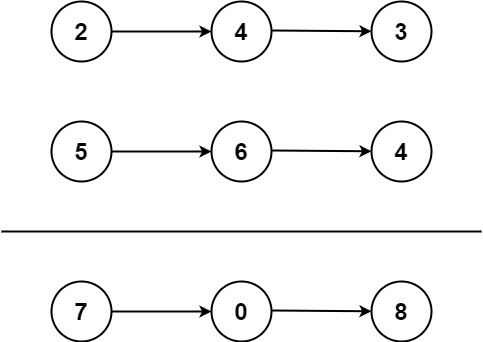Description
You are given two non-empty linked lists representing two non-negative integers. The digits are stored in reverse order, and each of their nodes contains a single digit. Add the two numbers and return the sum as a linked list.
You may assume the two numbers do not contain any leading zero, except the number 0 itself.
Example 1:

Input: l1 = [2,4,3], l2 = [5,6,4] Output: [7,0,8] Explanation: 342 + 465 = 807.
Example 2:
Input: l1 = [0], l2 = [0] Output: [0]
Example 3:
Input: l1 = [9,9,9,9,9,9,9], l2 = [9,9,9,9] Output: [8,9,9,9,0,0,0,1]
Constraints:
- The number of nodes in each linked list is in the range
[1, 100]. 0 <= Node.val <= 9- It is guaranteed that the list represents a number that does not have leading zeros.
Solution
Python3
# Definition for singly-linked list.
# class ListNode:
# def __init__(self, val=0, next=None):
# self.val = val
# self.next = next
class Solution:
def addTwoNumbers(self, l1: Optional[ListNode], l2: Optional[ListNode]) -> Optional[ListNode]:
curr = res = ListNode(-1)
carry = 0
while l1 or l2 or carry:
if l1:
carry += l1.val
l1 = l1.next
if l2:
carry += l2.val
l2 = l2.next
curr.next = ListNode(carry % 10)
curr = curr.next
carry //= 10
return res.nextC++
/**
* Definition for singly-linked list.
* struct ListNode {
* int val;
* ListNode *next;
* ListNode() : val(0), next(nullptr) {}
* ListNode(int x) : val(x), next(nullptr) {}
* ListNode(int x, ListNode *next) : val(x), next(next) {}
* };
*/
class Solution {
public:
ListNode* addTwoNumbers(ListNode* l1, ListNode* l2) {
ListNode res(-1), *curr = &res;
int carry = 0;
while (l1 || l2 || carry > 0){
if (l1){
carry += l1->val;
l1 = l1->next;
}
if (l2){
carry += l2->val;
l2 = l2->next;
}
curr->next = new ListNode(carry%10);
curr = curr->next;
carry /= 10;
}
return res.next;
}
};